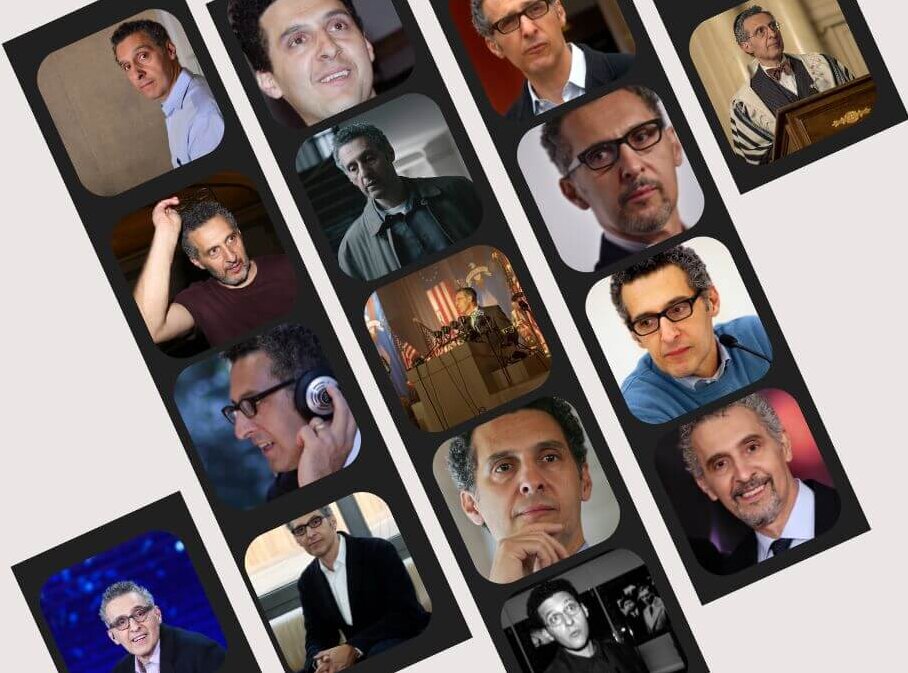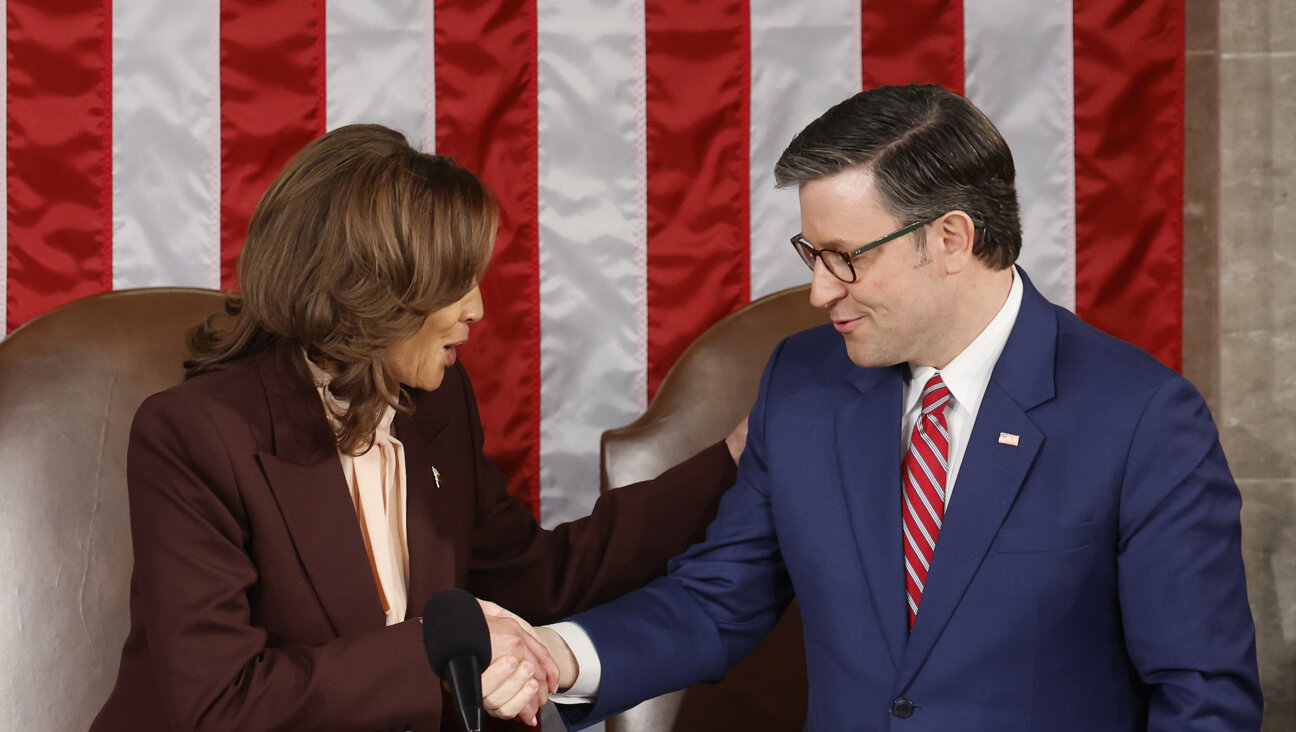Is John Turturro our greatest non-Jewish portrayer of Jews? A list of his best (and most-problematic) performances
With the actor now taking on Philip Roth’s ‘Sabbath’s Theater,’ a look back on his Jewish filmography

Is John Turturro the most accomplished non-Jewish portrayer of Jews? Photo by Getty/Canva/HBO
If your YouTube ads are anything like mine, you may have lately seen an image of character actor John Turturro draped in an American flag as klezmer music plays. This is a commercial for Sabbath’s Theater, a stage adaptation of Philip Roth’s National Book Award-winning novel about a libidinous puppeteer, Mickey Sabbath, who Turturro is playing Off-Broadway through November. One could say Turturro’s been preparing for the role — of a Jew swaddled in stars and stripes, as magnetic as he is repellent — for his whole career.
Turturro, born in the cradle of Jewish-Italian Brooklyn, is a proof of what I’ll call Italian-Jewish Transitivity, a quirk of casting and cultural affinity that allows for Harvey Keitel and James Caan to play mafiosi and Robert De Niro to play, well, mostly Jewish associates of mafiosi. But Turturro’s filmography — including his Hasidic sex comedy, Fading Gigilo — boasts a broader swath of American Jewry than most American Jewish actors get to play in a lifetime.
In Quiz Show, Hank Azaria, as a Jewish TV producer, describes Turturro’s Herb Stempel as “an annoying Jewish guy with a sidewall haircut,” a description that applies to a surprising number of Turturro’s Jewish turns. There is also the worldly mentor, Joey Knish in Rounders, a young poker player’s only friend in a world of sadistic Russian gamblers, and Barton Fink, a Clifford Odets stand-in with a bleeding heart for the working man and a deaf ear for their stories.
Turturro played Primo Levi, the Italian Holocaust survivor and chemist whose memoirs unearthed the moral ambiguity of Auschwitz. Yet, he also played an accessory to the Holocaust — the quisling Rabbi Lionel Bengelsdorf, whose commitment to Americanizing Jews endangers them all the more.
Not all of Turturro’s Jews are noble, and many aren’t even particularly nuanced in their portrayal, but taken together they present a fascinating cross-section of Jews in pop culture.
Below you will find them ranked — with ratings for their potential to embarrass the Jewish people (a patented Shondameter) and Jewfro volume. Take a look and consider: Is Turturro our most versatile non-Jewish portrayer of Jews? Or is he only as good as his material?
-
Harvey Brickman in Slipstream (2007)
In Anthony Hopkins’ unwatchable experimental film, Turturro gives flagrant life to a Jewish film producer named Harvey Brickman who stiffs screenwriters with the bill for expensive dinners, spends tee times pretending to chat with Martin Scorsese on a headset and is irate to learn an actor in one of his projects had the temerity to die of a heart attack. “Nobody dies until I tell them to die!” Brickman screams. He likes to yell — dropping the odd Yiddish expletive — and at one point nearly throttles a baby on a film set. The only thing saving this one from a full condemnation by Abe Foxman is that Brickman appears to be at least in part a figment of Hopkins’ character’s imagination as demonstrated by a later scene where Brickman gets trapped inside the hard drive of a computer.
Shondameter: Scott Rudin, though likely inspired by another producer named Harvey
Jewfro Quotient: 2 out of 10
-
Mo Flatbush in Mo’ Better Blues (1990)
Mo, along with his brother, Josh (played by Turturro’s real-life brother, Nicholas), single handedly set back Spike Lee’s goodwill with the Jewish community by checking just about every box for stereotypes of rapacious record producers. Litigious, greedy, unwilling to negotiate — or trust even his mother — Flatbush is an avatar of a real historical problem: Jewish music executives who took advantage of Black artists. The problem with the portrayal is that the character’s Jewishness is not incidental to this exploitation, but an inherent feature of it, with Mo’s wheeling and dealing laced with Yiddish, nepotism and a gratuitous mention of corned beef. (As an interesting aside, Ariel Levy, who co-wrote the stage adaptation of Sabbath’s Theater with Turturro, profiled Lee in 2006 and spent a fair amount of the article discussing the blowback Lee faced for these characters.)
Shondameter: Jerry Heller from Hell
Jewfro Quotient: 6 out of 10
-
Howard Cosell in Monday Night Mayhem (2002)
Turturro took on a huge risk in playing a man whose voice and mannerisms were, for decades, among the most observed in America. He failed spectacularly. Striving for a more sonorous tone to his natural Brooklyn affect, Turturro couldn’t quite shake his own baseline graveliness and so this turn as a legendary Jewish sportscaster leaves a lot to be desired. One thing it does manage is the divisiveness of Cosell’s persona. Pretentious, affable and deeply insecure, Cosell at first calls his bad press for hosting Monday Night Football a “literary pogrom,” an ostensible overreaction later vindicated by bomb threats and antisemitic fan mail. Turturro is equal to Cosell’s pathos, but the writing by The Late Shift’s Bill Carter and direction from regular Spike Lee cinematographer Ernest Dickerson, isn’t always there to catch him. Admitting to the toll his job is taking on him, he confides in his wife, Emmy (Patti LuPone) that he’s “out there all alone.” And then, he somberly peels off his hairpiece, which can’t help but elicit a chuckle.
Shondameter: Depends what you think of Cosell
Jewfro Quotient: 0 out of 10 — we’re in the realm of plastic-looking toupees
-
Herb Stempel in Quiz Show (1994)
Turturro famously packed on pounds and blackened a tooth to play trivia contestant and whistleblower Herbie Stempel in a performance Commentary’s Joseph Epstein dubbed a “walking ADL nightmare.” Looking a bit like Jeopardy! champ Buzzy Cohen, only shlubbier, and perhaps as polarizing an on-air personality as Cosell, Stempel is a know-it-all whose pastimes include kvetching about his in-laws and showboating before the odd congressional committee. Turturro met the real-life Stempel and took pains to capture his nasal, Bronx-by-way-of-Queens, voice. But while Stempel was not exactly telegenic on the quiz show Twenty-One, he comes off as more endearing in clips than Turturro’s imitation. The show’s sponsor, Geritol, may have wanted to stamp the too-Semitic Stempel out, but the tape doesn’t lie — the audience laughed at his antics.
Shondameter: That one uncle we all have who challenges the historicity of the Exodus during Passover Seders
Jewfro Quotient: 1 out of 10 — it’s described as a “sidewall haircut” and Turturro says it was thinned for the role.
-
Primo Levi in The Truce (1997)
In the canon of Turturro movies that follow the story beats of The Odyssey, this adaptation of Primo Levi’s memoir of the same name comes in second after O Brother, Where Art Thou? Donning an Italian accent and an ever-quizzical look, Turturro’s Levi wends his way home after the liberation of Auschwitz. In several poignant moments, he asserts his Jewishness to Poles and Russians who’d give him a better reception if he were a political prisoner. Playing Levi, he also conveys deep insights about how the camps, at their worst, robbed prisoners of compassion. But it’s not the words, many taken verbatim from Levi’s writing, that land the biggest punch. In a moment towards the end, he spots a German railway worker — a man complicit in his deportation — and parts his coat to reveal the badges on his camp uniform. The worker bows, and the viewer is moved by the gesture’s quiet dignity.
Shondameter: N/A — he plays Primo Levi for goodness sake
Jewfro Quotient: N/A
-
Sid Lidz in Unstrung Heroes (1995)
An electrical engineer who delights his children with inventions, and offers Talmudic responses to questions like “how many stars are there?” Sid is odd but nowhere near as eccentric as his brothers, who live an Extreme Hoarders-like existence and are inclined toward conspiracy (insisting “I Like Ike” is code for “I Hate Kikes”). Sid does his best to care for his terminally ill wife and his children, but loses his composure when he learns son, Stephen (now going by Franz), is studying for his bar mitzvah, against his non-practicing, science-forward philosophy. In an ending that feels very proto-Fabelmans, Sid reconciles with his son over secretly-filmed home movies of a tender moment with his wife. Both the scientist and the future memoirist agree — “documentation is important.”
Shondameter: Not much here — Sid’s a mensch
Jewfro Quotient: 11/10 More Kid ’N Play than anything
-
Joey Knish in Rounders (1998)
We’re never made privy to how exactly Joey Knish got his starchy moniker, but we do know he’s almost definitely a member of the tribe. A mentor to Matt Damon’s plucky poker-playing law student, Mike McDermott, Knish started earning a living playing cards at 19 and looks cool in tinted glasses and even a velour tracksuit. Happy to buy coffee, offer a toke and give guys who go bust a gig driving a truck, he’s a solid guy in a world of lowlifes. Ed Norton’s character says he “sees all the angles but he doesn’t have the balls to play one,” but we come to understand why he’s more cautious at the table than most. At a shvitz downtown, he offers to help Mike out of a jam with some money, but not the 15 large he needs. “I’m not playing for the thrill of f—ing victory here,” Knish says. “I owe rent, alimony, child support. I play for money — my kids eat.”
Shondameter: What can you really have against a solid provider like Knish?
Jewfro Quotient: 7 out of 10 — pleasantly springy
-
Bernie “the Shmatta” Bernbaum in Miller’s Crossing (1990)
An odious bookie (“ethics-wise, he ain’t got any”) Turturro said he drew inspiration from Leopold and Loeb in creating the look of Bernie Bernbaum. He also claimed he had his lines read back to him in Yiddish. Oy. At the drop of a hat, Bernie goes from groveling for his life to blackmailing the man who spared him. A wholly reprehensible character. But dammit, look into your heart! You know it’s a career best.
Shondameter: This guy makes Bugsy Siegel look like Bugs Bunny
Jewfro Quotient: 0/10 Bernie slicks it back
-
John Stone in The Night Of (2018)
There isn’t much specific evidence that Turturro’s John Stone, a “precinct crawler” attorney defending a Pakistani-American college kid accused of murder, is among the Chosen. When one of his clients wonders why he didn’t get “time like the Jew guy” in the trial before his, Stone doesn’t seem to take it personally. He also doesn’t hesitate to tell a high school class it would be his “duty as an officer of the court” to defend Hitler. Still, Stone’s season-long struggle with cat allergies and leper-like foot eczema feels extremely Jewish, and for these reasons, he makes the list.
Shondameter: With ambiguous Jewishness, it’s tough to say, but I’d gladly count him a landsman
Jewfro Quotient: 7 out of 10 — luscious with a bit of gray
-
Barton Fink in Barton Fink (1991)
Fink wrote the Awake and Sing! of the fishmongers on Fulton Street and, like many a lefty playwright before him, signs to a lucrative contract for a film studio in the 1940s. A fish-out-of water tasked with writing a wrestling picture in a flophouse hotel, Fink contends with a persistent mosquito, peeling wallpaper and the death of a woman in his bed while struggling to apply his lofty ethics to a B movie. We feel for Fink, but we know he sucks. His posturing as a champion of the common man is condescending and his opinion of his contributions to the world of drama is outsized and delusional. But Fink is also a prototype of the Jobian schlemiel the Coen Brothers later perfected in A Serious Man. It’s a career-best performance by Turturro and it’s hard to imagine anyone else doing it justice.
Shondameter: Less than Norman Mailer, more than Arthur Miller
Jewfro Quotient: 11/10, nearing Eraserhead levels
-
Rabbi Lionel Bengelsdorf in The Plot Against America (2020)
Rabbi Bengelsdorf leads the B’Nai Moshe Synagogue in Newark, New Jersey, but hails from South Carolina, and has the bearing of the gentry on the other side of the Mason-Dixon. He rides a horse named “Soos” (Hebrew for “horse”), and writes poetry in the saddle. He admires Judah Benjamin, while decrying the injustice of the Confederate cause. Clad in a professorial bowtie and wire-rimmed glasses, he volunteers to serve an isolationist president whom he insists has nothing against the Jews. Desperate for acceptance, Bengelsdorf, who appears at the bimah singing “Lecha Dodi” and quoting Isaiah’s words on swords and plowshares, is a willing dupe of the administration. Turturro plays him with a frighteningly believable refinement and a nearly tragic fall from grace. In denial till the very end, he gives more than a bravura performance, he supplies a cautionary tale about threats Jewish leaders dismiss at their own peril. It’s no wonder why, after playing this part, Turturro was eager to take on another of Philip Roth’s characters. (It helps that the two men knew each other.)
Shondameter: Stephen Miller meets Chaim Rumkowski with a dash of Judah Benjamin
Jewfro Quotient: A respectable 6 with the kippah on
As for the actor’s next role, it may lie in inhabiting a very different Jewish writer from Roth. In August, in the midst of a new round of debates about who may play a Jew, Mark Harris, the husband of Tony Kushner, said his spouse would “probably best be played by John Turturro.”






















